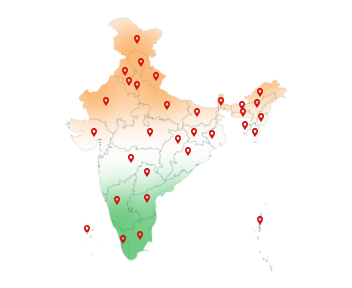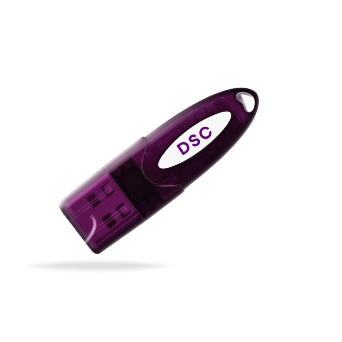25-Jul-2025
DSC GST Full Form: Meaning, Use, and Importance in 2025
In India's growing digital economy, more businesses are moving online, and so are their tax filings. One term that keeps popping up on the GST portal and during return filing is DSC GST full form — an essential concept that every taxpayer, business owner, and chartered accountant must understand.
DSC stands for Digital Signature Certificate, and in the context of GST, it enables secure and legally valid signing of forms, returns, and applications. If you're a company, LLP, or an authorized signatory, you'll likely need to submit with DSC in GST, whether you're registering for the first time or filing monthly returns.
You can buy Capricorn DSC to get started with GST filings quickly and securely.
What is DSC GST Full Form?
The DSC GST full form stands for Digital Signature Certificate in Goods and Services Tax. It is a secure, encrypted electronic certificate used to sign GST-related documents online. Think of it as your digital identity while dealing with government tax platforms.
Just like how you physically sign a document to validate it, a DSC allows you to do the same — but online. And more importantly, it's legally recognized under the Information Technology Act, 2000.
Why Is DSC Required in GST?
Let's explore why knowing the DSC GST full form is more than just understanding an acronym — it's about legal compliance, data security, and faster operations.
Here's Why You Need a DSC in GST:
1. Mandatory for Certain Entities: All companies, LLPs, and foreign firms must use a DSC when filing anything on the GST platform.
2. Legally Recognized: A DSC holds legal validity and is admissible in Indian courts.
3. Prevents Tampering: It ensures the integrity of the document and confirms it hasn't been altered post-signing.
4. Faster Filings: Say goodbye to printing, scanning, or sending physical papers.
That's why, for many businesses, the DSC required for GST registration is not optional — it's a must.
Types of DSC Accepted in GST
There are three types of DSCs — Class 1, Class 2, and Class 3. As of 2021, Class 3 DSC is mandatory for all GST-related activities. Thus, DSC in GST means more than just digital signatures—it means using a specific, government-approved cryptographic certificate for legally recognized submissions.
How to Use DSC on the GST Portal?
The DSC GST portal is where all your digital signing happens. But many users face issues if the setup isn't done right.
Simple Steps to Use DSC on the GST Website:
1. Get a Class 3 DSC from a licensed Certifying Authority like Capricorn CA
2. Install the Required Signing Utility from the GST portal.
3. Install the Utility and run the application.
4. Plug in the USB token (if applicable).
5. Log in to the GST portal > Go to “My Profile” > Click on “Register/Update DSC.”
6. Select the PAN-linked authorized signatory.
7. Sign the document and submit.
If you skip these steps or forget to update your DSC, you won't be able to file — especially when required to submit with DSC in GST for authentication.
Real Meaning: File with DSC in GST
Ever seen the phrase file with DSC in GST meaning pop up and wondered what it involves?
Here's the answer: It means you're digitally signing the GST return, form, or registration application using your DSC. This signature is necessary for the submission to be considered legally valid.
Where You Must File with DSC in GST:
1. GST Registration (Companies/LLPs)
2. Filing GSTR-1, GSTR-3B, and Annual Returns
3. Applying for Core Field Amendments
4. Responding to Notices or Demands
In short, file with DSC in GST meaning equals digital authorization, ensuring only the rightful person is submitting the document.
Demystifying the Term “DSC GST Rate”
One of the most misunderstood terms related to DSC is DSC GST rate. Many users wrongly assume this has something to do with tax slabs.
Here's the Truth:
The DSC GST rate refers to the cost of obtaining a DSC that will be used for GST compliance. It has nothing to do with 5%, 12%, 18%, or 28% GST tax rates.
Typical Cost of a Class 3 DSC:
1. ₹800 to ₹1,500 for 1 or 2-year validity.
2. Rates vary based on providers and whether you include USB tokens.
While the DSC GST rate doesn't affect your GST return, understanding its cost can help businesses plan their compliance budgets better.
What DSC in GST Means for Different Business Types?
Understanding what dsc in gst means is crucial for different taxpayer categories:
For Companies and LLPs:
- DSC is mandatory for all registrations and filings.
For Proprietorships:
- DSC is optional. Aadhaar-based OTP works fine unless notified otherwise.
For Foreign Entities:
- A valid Class 3 DSC with passport-based KYC is required.
For GST Practitioners:
- Must have their own DSC if filing on behalf of clients.
This is also why you'll see so many queries about dsc required for gst registration — because businesses can't proceed without it.
Common Issues and Fixes While Using DSC
Even after understanding the DSC GST full form, technical issues can create roadblocks.
Common Problems:
- USB token not detected
- "Failed to establish connection" error
- Browser compatibility issues
Fixes:
- Always use updated versions of browsers (Chrome, Edge, or Internet Explorer).
- Make sure Java is installed and enabled.
- Re-register DSC on the portal after renewing.
And remember, if the DSC GST portal shows errors, clear browser cache and retry.
How to Apply for a Class 3 DSC for GST?
Here's a simple checklist to apply for a DSC, especially if your GST work is pending.
Steps to Get a Class 3 DSC:
1. Choose a government-authorized Certifying Authority (Capricorn CA).
2. Submit KYC documents (PAN, Aadhaar, passport-size photo).
3. Complete video verification (mandatory from 2021 onwards).
4. Make the payment.
5. Receive USB token via courier.
Once your DSC is activated, you can proceed to sign and file with DSC in GST, as required.
FAQs About DSC and GST
1. What is the DSC full form in GST?
Answer: The DSC full form in GST is Digital Signature Certificate in Goods and Services Tax.
2. What does submit with DSC in GST mean?
Answer: It means signing any GST form or return with a valid DSC before submission, making it legally binding.
3. Is DSC mandatory for everyone?
Answer: No. It is mandatory for companies, LLPs, and foreign entities. Proprietors can use Aadhaar OTP.
4. What if my DSC has expired?
Answer: Renew your Class 3 DSC immediately. Otherwise, your GST filings will be blocked.
Conclusion: DSC GST Full Form Simplified for You
The DSC GST full form — Digital Signature Certificate in Goods and Services Tax — is more than a technical term. It represents a secure, digital way to prove your identity and authorize submissions on India's GST portal.
From registrations and return filings to core amendments and legal responses, the DSC is your gateway to seamless compliance. It keeps your documents secure, legally valid, and tamper-proof.
So the next time someone asks, “file with DSC in GST meaning?” — you'll have the complete answer.


